Review of WWE: Shawn Michaels - Heartbreak and Triumph (3 Discs)
Introduction
Whereas in terms of match quality, Ric Flair is generally regarded as the greatest professional wrestler of the 1980s, it is likewise Shawn Michaels who often garners the votes, when it comes to the 1990s. Be it as part of the Rockers tag team with Marty Jannetty, or as the Intercontinental or WWF World Champion, Michaels` displays were consistently outstanding, having dozens of superb matches on television and pay-per-view alone.
His career looked to have ended abruptly in 1998, when he suffered a serious back injury during his Royal Rumble bout with The Undertaker. His last match of the decade, then, was to lose the WWF Championship to "Stone Cold" Steve Austin at Wrestlemania that year.
But by this point, Michaels` career had been shrouded somewhat in controversy but accusations of drug abuse, and of exerting his backstage clout for purely selfish means. The most famous instance of the latter was in the build-up to 1997`s Survivor Series, at which Bret Hart was due to lose the WWF Title to Michaels, before departing for the rival WCW company. Michaels and Hart had had many problems during the year, which included Michaels claiming an injury to get out of losing the WWF Title to Hart at Wrestlemania XIII. Just weeks prior to the Survivor Series, Hart came to Michaels to let him know that he was willing to let bygones be bygones, and that he would be happy to lose the title to him at the Survivor Series. But Michaels responded to the situation by arrogantly proclaiming that he would never be willing to do the same for Hart, which caused the latter to rescind his offer, with all the old wounds being opened once again.
The result of all this became known as "The Montreal Screwjob", where Michaels, Vince McMahon, and cohorts went against the script to make it appear that Michaels had defeated Hart for the title. This violated a clause in Hart`s contract, which specifically stated that Hart did not have to partake in any storyline that was not mutually agreed upon. Immediately after the bout, Michaels` claimed that he did not know that those were McMahon`s planned actions - a statement he later said was a lie - and although Hart could easily have sued McMahon for breach of contract, he instead took matters into his own hands, knocking McMahon out with a single punch in the dressing room.
In any case, six months after the Survivor Series, Michaels` in-ring career was over, at least until he wrestled Triple-H at 2002`s Summerslam. It was not expected that Michaels would return to wrestling full-time, but while his house show (non-televised) event schedule was greatly reduced, he did continue to compete on television and pay-per-view, something which he has done to the present day.
This 3-disc set, then, contains a documentary look at Michaels, as well as 14 matches matches - stretching from 1985 to 2007 - in which he starred.
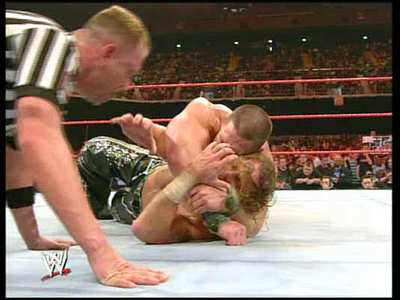
Video
Video is presented in 4:3 fullscreen PAL, and is very good for a DVD of this genre. There is a lot of archive footage used here, all of which looks tremendous considering that it has likely not been particularly well archived. The new interview footage, with personalities such as Michaels, Jim Ross, Marty Jannetty, and Chris Jericho, looks consistently good.
One mildly annoyance regarding the video is the blurring of some instances of the phrase "WWF". In short, this is because of a court issue with the World Wildlife Fund (also WWF).
As regards the transfer to DVD, there are some compression artefacts noticeable throughout, but they are minor and are not distracting in the least.
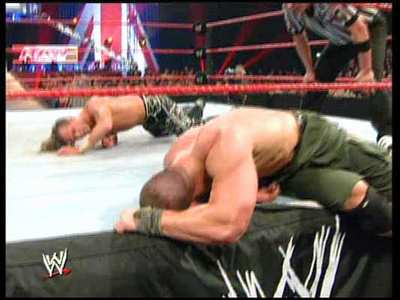
Audio
Audio is presented in Dolby Digital 2.0, and is also very good. Everything is mixed well, so that interview audio can easily be heard over the background music. This is a very easy soundtrack to listen to.
Much like the video, the phrase "WWF" is not allowed to be used on these releases, and thus anytime it is used in archive footage, you won`t hear the "F". Again, this is sad, but unavoidable.
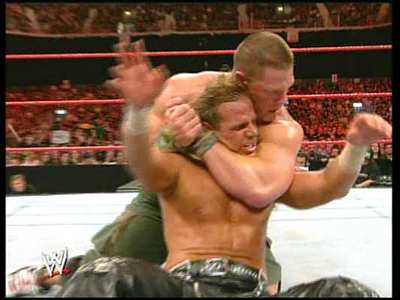
Features
Bountiful extras are spread across all three discs here, with Disc One containing some deleted scenes, and extra stories from the documentary`s participants. There were some interesting notes, particularly Marty Jannetty`s story of fisticuffs with his then tag team partner, but most of the best information was in the main feature.
Onto Disc Two and the bonus matches, then, which begin with a match from very early in Michaels` career, against Billy Jack Haynes in Texas` World Class Championship Wrestling. It`s a short match, as expected, but it`s tremendous to see footage here that has likely never been seen since it first aired on American television.
From there, we jump to AWA and the Midnight Rockers tag team with Marty Jannetty. In an AWA Tag Team Title match, the combination face Buddy Rose & Doug Somers, in a contest which really doesn`t live up to the standards of the names involved. The proceeding bout with Super Ninja and Ninja Go, however, is better, with great crowd heat.
On to the World Wrestling Federation, then, and a tag team match against Arn Anderson & Tully Blanchard, collectively known here as The Brain Busters. There was a wonderful build in the opening ten minutes of this match, and had the teams been afforded five minutes minutes more, for a more satisfying finish, this would have been a tremendous bout. On a side note, it was great to hear the late "Lord" Alfred Hayes (from Luton!) on commentary.
A video (VHS or DVD) first was then next, as The Rockers faced The Hart Foundation in a 2/3 falls match. This is a famous bout in WWF history, even though, until now, it has never been seen, even on television. The bout was taped for an episode of the popular NBC show "Saturday Night`s Main Event", and was scheduled to see The Rockers win their first championship. However, after 15 minutes of action that wasn`t as smooth as you would think, the top rope broke, against the script. Rather than fix it immediately, the bout continued with no top rope, making the second fall rather poor viewing, so much so that Bret Hart and Jim Neidhart in particular are visibly and audibly annoyed. The rope was fixed for the third fall, but the match was so under-par for these teams, that it was scrapped from the NBC telecast, and was only ever acknowledged in passing on WWF TV.
The proceeding bout with the second incarnation of the Orient Express (Kato and Tanaka) is another example of fantastic tag team wrestling, and may be the best bout on this entire collection. I can`t recall a bout where I saw better teamwork, which in one way is very sad, considering the poor health of today`s tag team division. In any case, this is a must-see bout for any wrestling fan.
We then move away from the Rockers, and to Michaels` heel turn, for a bout in which he faces Davey Boy Smith, "The British Bulldog". This is a very good, fast-paced bout, which also tells an excellent story. This was the bout that set Michaels on the road to singles super-stardom.
The final bout on Disc Two is the 1995 Royal Rumble match, in which Michaels enters at Number 1. It`s a reasonable match, with some memorable (good and bad) personalities. However, it does suffer from having only one minute, rather than the previous two, between entrants.
Onto the third and final disc then, which begins with a superb bout with Jeff Jarrett, from an In Your House pay-per-view. These shows did not air in the UK, and thus, this is a great chance to view this very entertaining, well-paced encounter. Those who deride Jarrett may have their minds changed upon watching this one.
Davey Boy Smith is back in the next encounter, switching roles with Michaels to be the heel to Michaels` babyface (good guy). My recollection of this match, from 1996, was of it being very good indeed, but watching in 2008, it is spectacularly good, and would almost certainly be WWE Match of the Year if it were held today. There is a slight video issue consistently at the top of the screen during this match, but it will not put you off this tremendous bout.
One of the best matches in Raw TV history is up next, as Michaels battles Triple-H in what is easily a pay-per-view main event calibre match.
Once again from Raw, there`s a fun match as The Rockers reform to face La Resistance, before Michaels` faces Kurt Angle in a Wrestlemania re-match. I`m not sure that I would like to say that it is better than the Wrestlemania match - which was probably WWE Match of the Year for 2005 - but it was right up there in contention with it.
The last bout is the famous match with John Cena from Earl`s Court, London, which was an exceptionally long bout by WWE standards. Although it has recently been seen on two other WWE releases, it`s an encounter certainly worthy of its inclusion here.
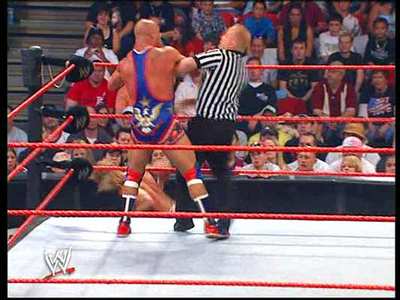
Conclusion
These days, its unusual to find a WWE documentary that does not push all the right buttons. In general, they are in-depth, and provide somewhat insider opinion as to the machinations of pro wrestling, which, for older fans in particular, is often more appealing than today`s product.
"Shawn Michaels - Heartbreak and Triumph" is an excellent look at the real-life Michael Hickenbottom, starting off looking at his school life, and how he got into wrestling. From there, the tale is told of his plight in Bill Watts` Mid-South Wrestling, and Verne Gagne`s American Wrestling Association, before hooking up with the World Wrestling Federation in 1987.
Michaels` career has always been a controversial one, especially in the WWF period. For example, having not long arrived in the company, Michaels tells the story here of the day that Vince McMahon fired them for supposedly causing damage to a bar that the wrestlers were in. Michaels` version is a little different.
It`s interesting that the subject of drugs comes up, considering the recent furore regarding them, in the wake of the Chris Benoit murder-suicide. But the subject is talked about quite openly, in reference to Michaels` 1994 suspension.
Details of "The Clique" (a group of wrestlers, including Michaels, who were despised in the company for having too much say in wrestling matters) and the "Curtain Call" (when said wrestlers deliberately broke script following a Michaels vs Diesel bout) are very interesting indeed, and often go against the generally-held opinions of wrestling historians. That is absolutely the case when the subject of the "Montreal Screwjob" comes up, as some of the opinions noted here are quite embarrassingly biased.
That doesn`t take away from what is enthralling viewing, however, and the latter part of the documentary focuses less on these types of controversies, and settles for looking at the big matches that Michaels has had in recent years. It`s a fun way to finish another excellent WWE production.
Overall, from possibly the greatest wrestler of his generation, it would be difficult to expect anything less than a great 3-disc set here. But "Triumph and Heartbreak" lives up to every expectation, with a tremendous documentary, and a superb series of matches available here. What`s always a pleasant surprise is that very little of the content from the previous Michaels release "From the Vault" is included here.
That makes this DVD set a must-have for any wrestling fan, and one of the very top DVD releases in this genre.
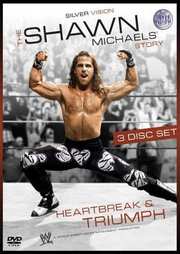




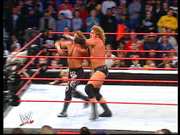
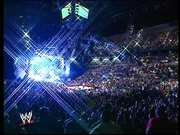

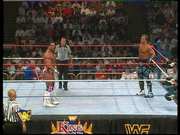
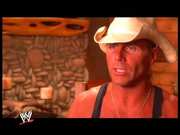
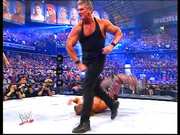
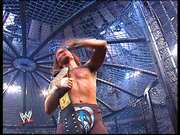



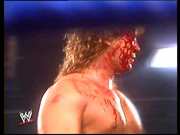




















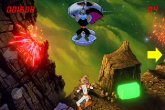











Your Opinions and Comments
Be the first to post a comment!